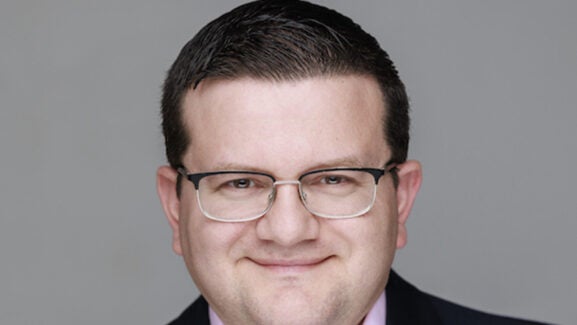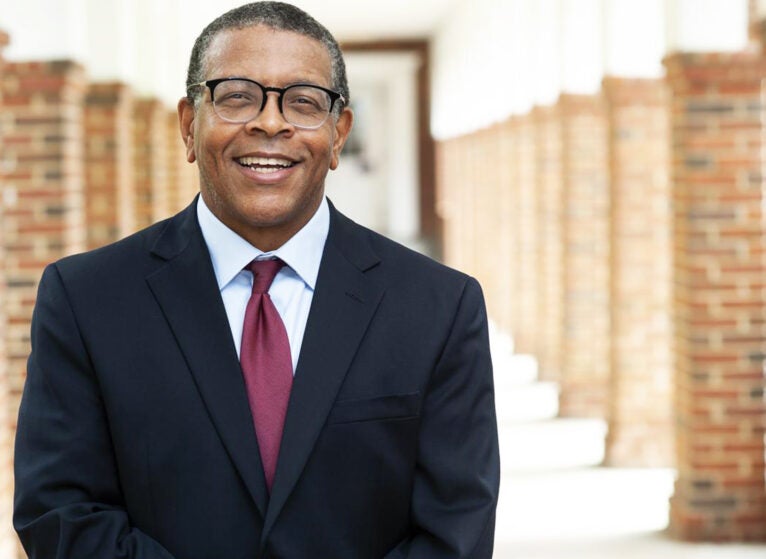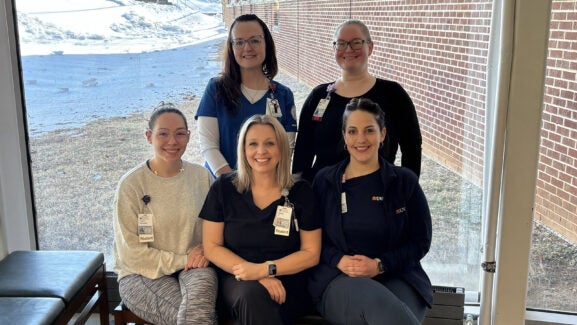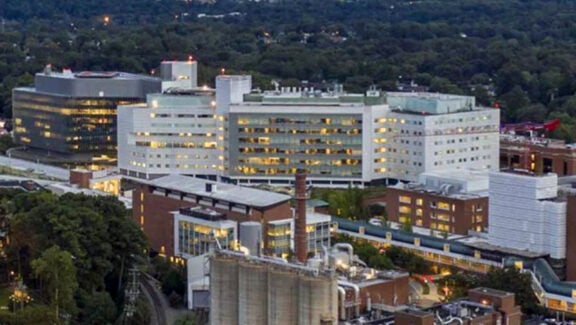

Q&A: UVA Health’s Leading DEI Advocate, Dr. Tracy Downs, on ‘Racial Healing: The Heart of Racial Equity’
Tracy M. Downs, MD, FACS, has served as UVA Health’s inaugural Chief Diversity and Community Engagement Officer — and UVA School of Medicine (SOM)’s Senior Associate Dean of Diversity, Equity, and Inclusion — since July 2021. He’s our leading advocate of diversity, equity, and inclusion (DEI) and related initiatives across our health system and in our community.
In this conversation with Connect, Dr. Downs talks about the 2024 Black History Month theme of Racial Healing: The Heart of Racial Equity.
Q: How is racial healing at the heart of racial equity? Do you feel you can’t have equity without healing?
At UVA Health, our theme for 2024 Black History Month is in alignment with the Kellogg Foundation’s theme ‘Racial Healing: The Heart of Racial Equity.’
The Kellogg Foundation highlights that racial healing matters because it helps affirm the inherent value of all people, deepens our understanding of the different life experiences for each of us, and helps us lean into difficult conversations needed to restore wholeness in ourselves and amongst each other.
As a surgeon, I understand quite well the complex, physiologic systems that are involved to bring about healthy wound healing following an operation. I am also aware of the impact that a ‘festering infection’ can have in delaying wound healing, causing the incision to re-open and requiring detailed wound care — only to have the wound break down again and again without healing, if the infection is not fully evacuated.
Racism is not always conscious, explicit, or readily visible. Often, it is hidden into our mainstream culture leading to differences of opinion, in which one person questions if it exists at all, to a contrary belief acknowledging that it is pervasive in all aspects of life. The concept of ‘othering’ around race is a form of marginalization based upon one’s racial identity which can lead to physical, mental, and emotional stresses that can impact one’s health.
In order for racial healing to occur, it is a bi-directional process and that is where racial equity is important. Similar to the non-healing ‘surgical wound,’ we have to establish a diagnosis and a cause for the wound ‘not healing.’ Once the diagnosis is made, we begin therapy (e.g., antibiotics, drainage) which addresses the root cause and restores the capacity of the human body to heal.
In a similar manner, we must establish and acknowledge the problem of ‘racial trauma’ and then initiate therapy — in this case — racial equity, in order to restore the capacity or agency of an individual, a community, and a population to begin the process of racial healing.
Q: This year’s Black History Month theme “reflects our commitment to creating a healthcare environment that not only champions DEI — but actively addresses historical racial disparities and health inequities.” Can you share how these are being addressed?
One example is how we are increasing public awareness of the disappointingly longstanding and higher death rate of pregnant African American women in the U.S. We have raised awareness through a community viewing of various documentaries around Black Maternal Mortality and Birthing Justice.
This month, we co-sponsored a documentary event with one of our African American UVA sororities and the UVA School of Medicine Office of DEI. We also are working closely with our Department of Obstetrics and Gynecology at UVA Health, plus an expert nonprofit, the Birth Sisters of Charlottesville — a women of color, community-based, doula collective supporting women of color through their birth journey and into motherhood.
Q: In UVA Health’s ASPIRE values, E stands for equity — defined as “fostering an environment of belonging that promotes justice, equity, diversity, inclusion, and unity throughout the organization and within the communities we serve.”
And your office is leading the charge here — with a mission to “cultivate an inclusive community that embraces, values, and celebrates diversity and creates an engaging, equitable environment.” What are some of the successes?
We are still a relatively new office, but to name a few, I would recognize our consistent heritage month celebrations during which we recognize and acknowledge the background and stories of people from different cultural backgrounds (e.g., Black History Month, National Women's History Month, National Asian American/South Pacific Islander Heritage Month, National Hispanic Heritage Month, National American Indian Heritage Month). For our LGBTQ+ population, we celebrate Pride Month, and we have gained national distinction from the Healthcare Equality Index (HEI) — the national LGBTQ+ benchmarking tool that evaluates healthcare facilities' policies and practices.
Our Justice, Equity, Diversity, and Inclusion Strategists (JEDIs) education program harnesses the knowledge and experience of our faculty to partner in creating workplaces that are respectful and value diverse backgrounds. In our communities, we are very proud of the accomplishments of the Latino Health Initiative (LHI) led by Dr. Max Luna, and our community health stations in the Fifeville neighborhood of Charlottesville which were started by Jackie Martin, MPH, Director, Community Partnerships and Health Equity in our UVA Health Office of Diversity and Community Engagement.
Q: In appreciation of UVA Health’s work with community partners in Fifeville — such as wellness programs, blood pressure checks, flu and COVID-19 vaccines, Medicaid education, CPR training, cancer screening information, food access, nutrition programs, and more support services on the way — Abundant Life Ministries recently honored the UVA Health Office of Diversity and Community Engagement with the Outstanding Community Partner Award.
What does this recognition mean to you and your office?
Unexpected but appreciated! Abundant Life Ministries is such an amazing organization — the ‘gold standard’ for community engagement. The recognition increases our drive to do much more and earn community trust. As an institution and a health care system, we have such a long road ahead because of our past with the displacement of our African American communities. Our approach must be one of consistency. We need to be a listening and learning organization for our communities, and understand how we can best work together to be both good neighbors — and good stewards of their health and health outcomes.
For many in the diverse communities where we provide healthcare, there remains an uneasy tension between trust and betrayal — and hope and despair. The word picture that comes to mind for me when I think about this type of tension is the scene from a ‘Charlie Brown’ cartoon, when he runs to kick the football that Lucy is holding and she always removes the ball not allowing him to kick it. In that scene, you can see Charlie Brown’s frustration and disappointment along with every bone in his body aching. The community often feels like Charlie Brown.
We should be a great university, health system — and a great neighbor.
On a Personal Note …
Q: How was your own interest in medicine first sparked; what challenges did you face?
By a college professor who said I should consider the field of medicine. I also shadowed my grandmother’s cardiologist, Dr. Jerome Robinson. I lacked minority physician role models, so I was fortunate Dr. Robinson, who was an African American male, took an interest in me. My mom, grandmother, and brother were my role models, but I didn’t come from a medicine family, so I had to build my own “circle of support” — peers and faculty who could help me design a blueprint for me to get into the very competitive medical schools.
Q: What advice do you have for the next generation of those underrepresented in medicine to overcome similar obstacles?
Believe in yourself, and don’t cancel your own dream to be in medicine without obtaining expert advice from admissions offices and student affairs offices within your local medical school. It is also important to link up with your local medical or nursing school DEI office; this office will have expertise in helping other underrepresented in medicine students successful gain acceptance into medical school.
Q: How do you juggle your clinical, faculty, and leadership roles?
I am a part of a great department (Go Urology!) and I have several colleagues who both encourage and support me in my administrative roles. I enjoy clinical practice and helping the individual patient, and it also helps me to understand the climate and culture within UVA Health.
As a faculty member, I understand most of the stressors — whether electronic medical records, academic scholarship — so we do our best to design DEI learning components that are linked to our strategic plan, plus “bite sized” in a sense that our faculty and staff can participate in our DEI initiatives, but not at the expense of their multiple additional responsibilities.
At UVA Health’s Office of Diversity and Community Engagement, Dr. Downs works in partnership with Tonya R. Fredericks, MBA, Sr. Advisor for Special Projects; Jackie Martin, MPH, CDM, Director, Community Partnerships and Health Equity; and Melody M. Pannell, MSW, M.Div., MACE, Director of Diversity and Community Engagement. At SOM’s Office of DEI, he works in partnership with Dwan Love-Dinkens, DEI Program Manager and Events Coordinator, and Ashley Woodard, M.S., Director of Diversity Programs and Strategic Partnerships.
Latest News



